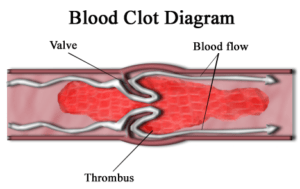
Diagnosed with Cancer? Your two greatest challenges are understanding cancer and understanding possible side effects from chemo and radiation. Knowledge is Power!
Learn about conventional, complementary, and integrative therapies.
Dealing with treatment side effects? Learn about evidence-based therapies to alleviate your symptoms.
Click the orange button to the right to learn more.
- You are here:
- Home »
- Blog »
- side effects ID and prevention »
- Multiple Sclerosis and your risk of Blood Clots
Multiple Sclerosis and your risk of Blood Clots

“Overall, the team concluded that Multiple Sclerosis patients are at increased risk of developing venous thromboembolism, and suggest that “there may be a role for VTE [venous thromboembolism] prophylaxis in high risk patients.””
As a long-term survivor of a blood cancer living with a host of long-term and late stage side effects the article linked and excerpted below was not a surprise to me. People living with multiple sclerosis have an increased risk of deep vein thrombosis aka blood clots.
The real issue is to provide possible prophylactic therapies that can reduce the risk of blood clots. The excerpts below are not intended to take anything away from conventional/FDA approved blood-thinning therapies. I am simply puting forth those therapies that I have used since my own blood clot back in April of 1995. I work to not develop another DVT.
My three favorite evidence-based, non-toxic therapies to reduce the risk of blood clot are:
- Therefore, these results suggest that curcumin and BDMC possess antithrombotic activities and daily consumption of the curry spice turmeric might help maintain anticoagulant status.
- “How does it work? Resveratrol might expand blood vessels and reduce the activity of cells important in blood clotting.“
- “There are good and solid evidence for the health benefits of omega-3 fatty acids. More recently, a new scientific study from Norway published in the Journal of Nutrition shows that supplementation with fish oil either equals or was better than eating fish regarding a reduction of venous thrombosis. The combination of fish and fish oil supplements can reduce the risk of venous thrombosis by almost 50%.”
For the sake of this blog post I am going to assume that there is no aspect of multiple sclerosis itself that increases the risk of blood clots. I don’t know the disease well enough to offer any beneficial info.
Being handicapped by radiation-induced lumbo-sacral plexopathy however, I can understand how limited mobility increases the risk of blood clots in MS patients. It goes without saying that you must work harder to stretch, exercise, etc. when your mobility is limited. I am lying on my bed stretching as I write this…
If you would like to learn more about deep vein thrombosis aka blood clots, scoll down the page, post a question or comment and I will reply to you ASAP.
Learn More About Blood Clots aka Deep Vein Thromboses- click now
Thank you,
David Emerson
- Cancer Survivor
- Cancer Coach
- Director PeopleBeatingCancer
Recommended Reading:
Resolve Blood Clots in Multiple Myeloma (MM)-
MS May Raise Risk of Deep-vein Blood Clots, Possibly by Limiting Mobility, Study Says
“People with multiple sclerosis may be twice as likely to develop deep-vein blood clots, a condition known as venous thromboembolism, than healthy people do, a study reports.
But data linking the two is limited, and its researchers say further work is needed to understand if MS is directly related to venous thromboembolism, or if this condition is a secondary effect of limited mobility…
A loss of flexibility and range of movement in the body or joints — called hypomobility — is a known risk factor for venous thromboembolism. In this condition, blood clots form commonly in the deep veins of the leg, groin, or arm, and travel in circulating blood to lodge in the lungs.
Certain neurological diseases are associated with partial paralysis and venous thromboembolism, including spinal injury and stroke.
Research into the incidence of venous thromboembolism in MS patients has only skimmed the surface. MS has a range of clinical features, such as disease type, duration, and severity, that could be associated with a higher risk of venous thromboembolism.
Researchers at Oxford University Hospitals and the Royal Berkshire NHS Foundation Trust examined how often venous thromboembolism occurred in MS patients. To do so, they compiled clinical data going back to the 1950s, and compared MS patients with healthy individuals.
Their literature review found 10 MS studies looking at the risk of venous thromboembolism. Of these, six studies involved large cohorts — more than 1,000 patients in each — and were included in the analysis.
Results showed that, on average, MS patients had a 1.91 times increased risk of a venous thromboembolism compared those without this disease. But this was not an entirely consistent result, with one study reporting that MS had a protective effect and lowered risk.
Disease severity, as defined by number and length of MS-related hospitalizations and need for walking aids, seemed to be the only factor predictive of venous thromboembolism.
But most of the studies did not characterize MS groups well enough for the researchers to make further conclusions. They could not examine if the MS type, disease duration, and treatment were associated with a higher venous thromboembolism risk.
Importantly, researchers were unable to determine if MS itself increases the risk of venous thromboembolism , or if secondary complications, such as hypomobility, are responsible…
Overall, the team concluded that Multiple Sclerosis patients are at increased risk of developing venous thromboembolism, and suggest that “there may be a role for VTE [venous thromboembolism] prophylaxis in high risk patients.””


